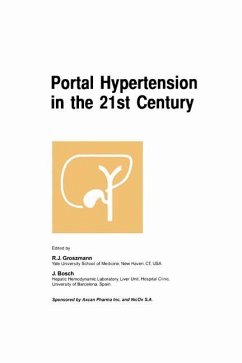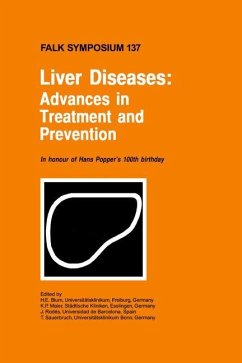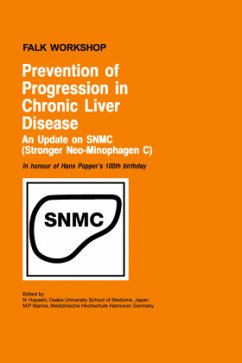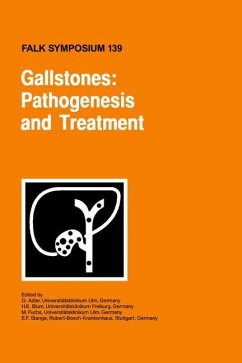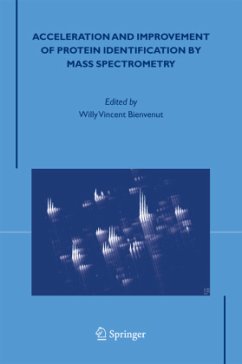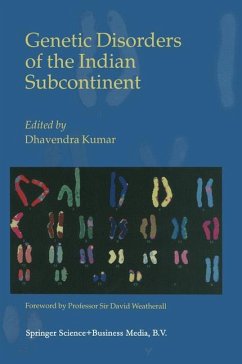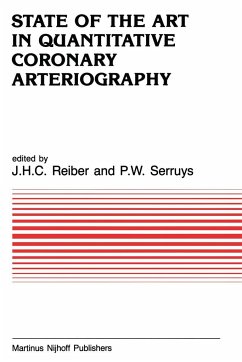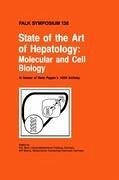
State of the Art of Hepatology
Molecular and Cell Biology
Herausgegeben: Blum, H. E.; Manns, M. P.
Versandkostenfrei!
Versandfertig in 1-2 Wochen
116,99 €
inkl. MwSt.

PAYBACK Punkte
58 °P sammeln!
This book is the proceedings of the Falk Symposium No. 138 on "State of the Art of Hepatology: Molecular and Cell Biology" (part of the XII International Falk Liver Week 2003 in honour of Hans Popper's 100th birthday, held on October 20--11, 2003), and reflects the tremendous advances in the science of hepatology both at the molecular as well as the cellular level.The book comprises four major sections. In Section I, the basic aspects of liver cell biology are covered, including RNA metabolism, regeneration, transport and metabolic functions, as well as fibrogenesis and malignant transformatio...
This book is the proceedings of the Falk Symposium No. 138 on "State of the Art of Hepatology: Molecular and Cell Biology" (part of the XII International Falk Liver Week 2003 in honour of Hans Popper's 100th birthday, held on October 20--11, 2003), and reflects the tremendous advances in the science of hepatology both at the molecular as well as the cellular level.
The book comprises four major sections. In Section I, the basic aspects of liver cell biology are covered, including RNA metabolism, regeneration, transport and metabolic functions, as well as fibrogenesis and malignant transformation. In Section II, the novel field of stem cell plasticity and cell therapy for liver diseases is discussed in detail, including stem cell biology, hepatocyte transdifferentiation from extrahepatic stem cells and their therapeutic use for liver cell repopulation, as well as hepatocyte transplantation. In Section III, novel therapeutic strategies for liver cirrhosis and hepatocellular carcinoma are presented, including the reversal of liver fibrosis, oncolytic biotherapy and different concepts of gene therapy for hepatocellular carcinoma. In Section IV, novel aspects of gene therapy and prevention of liver diseases are addressed, including small interfering RNAs, ribozymes, antisense oligonucleotides, as well as DNA vaccination.
An international faculty of outstanding scientists from different research areas presents the state of the art on these most important aspects of hepatology and their perspectives for future developments. Molecular and cell biology are at the very centre of research developments in modern hepatology and are of interest and importance to both basic scientists as well as clinicians involved in patient care.
The book comprises four major sections. In Section I, the basic aspects of liver cell biology are covered, including RNA metabolism, regeneration, transport and metabolic functions, as well as fibrogenesis and malignant transformation. In Section II, the novel field of stem cell plasticity and cell therapy for liver diseases is discussed in detail, including stem cell biology, hepatocyte transdifferentiation from extrahepatic stem cells and their therapeutic use for liver cell repopulation, as well as hepatocyte transplantation. In Section III, novel therapeutic strategies for liver cirrhosis and hepatocellular carcinoma are presented, including the reversal of liver fibrosis, oncolytic biotherapy and different concepts of gene therapy for hepatocellular carcinoma. In Section IV, novel aspects of gene therapy and prevention of liver diseases are addressed, including small interfering RNAs, ribozymes, antisense oligonucleotides, as well as DNA vaccination.
An international faculty of outstanding scientists from different research areas presents the state of the art on these most important aspects of hepatology and their perspectives for future developments. Molecular and cell biology are at the very centre of research developments in modern hepatology and are of interest and importance to both basic scientists as well as clinicians involved in patient care.



